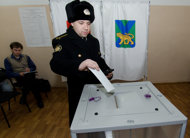Russians vote as Putin seeks return to presidency

Voters in the world's largest country, spread across nine time zones, are casting their ballots in a marathon election stretched over 21 hours in which victory for 59-year-old ex-KGB spy Putin appears inevitable.
There were queues for ballot papers at one polling station in the Pacific port of Vladivostok as large numbers turned out to vote early.
"Every vote is important when you live in a democratic country," Anna Antipenko, a student who was the first to cast her ballot at the polling station, told AFP.
Another voter, pensioner Zinaida Bykova, said she had voted for Putin.
"I know Putin for practical actions, not words," she told AFP.
Voting started at 2000 GMT in resource-rich Chukotka, diamond-mining Yakutia, Sakhalin island, Kamchatka and Magadan, the site of Soviet-era Gulag camps, and will end in the western exclave of Kaliningrad at 1700 GMT.
Turnout in Chukotka was 27 per cent two hours afer polls opened, an increase from the 2008 presidential vote and a potential indication of a high turnout nationwide, said the head of Russia's central election commission, Vladimir Churov.
"If there is such a turnout in Chukotka at 8am, then we can expect the most interesting turnout figures," Churov said, news agency RIA Novosti reported.
Despite the recent demonstrations, state pollsters have forecasted a first-round win for Putin with 60 per cent of the vote, leaving his Communist rival Gennady Zyuganov trailing in second place with 15 per cent.
The tycoon Mikhail Prokhorov and the flamboyant populist Vladimir Zhirinovsky are expected to battle for third place while the former upper house speaker Sergei Mironov is tipped to finish last, but there are no candidates representing the fledgling protest movement.
Putin's expected landslide victory may be tainted by political uncertainty unknown during the current prime minister's first two terms as president between 2000 and 2008.
Street protests that erupted in response to alleged fraud during December's parliamentary ballot have swelled into a broader opposition movement whose use of online networks echoes the Arab Spring revolts.
The authorities have installed web cameras in 90,000 polling stations for the first time in an attempt to demonstrate transparency.
Independent election monitors who are publicising alleged violations via the Internet during the polls have suggested that the authorities have been keen to minimise accusations of fraud during pre-election campaigning because of the protests sparked by the parliamentary polls.
The only difference during the presidential campaign was that "the methods of pressure on voters are more carefully organised, with a greater fear of publicity and public scandals", observer group Golos (Voice or Vote) said in a pre-poll statement.
The authorities cite opinion polls suggesting that only a minority of Russians back the anti-Putin cause.
But the country faces renewed protests after the elections on Monday, and police in Moscow are drafting in an extra 6,300 officers to ensure that demonstrators do not spill over into Red Square.
"We are going to respond to provocations with the full force allowed by law," warned Moscow police chief Vladimir Kolokoltsev.
Putin has put a brave face on the unexpected show of public displeasure by saying this week that he was "very happy about this situation."
"I think this is a very good experience for Russia," he said.
His four challengers have all admitted to only having the ambition of finishing second and possibly joining a runoff should Putin fail to pick up the 50 per cent of the vote required for outright victory.
The victor will win a six-year term in office, replacing Putin ally Dmitry Medvedev.
The election campaign saw a strong undercurrent of anti-Western sentiment which threatened to damage the "reset" in relations proposed by US President Barack Obama in 2009.
What the stars mean:
★ Poor ★ ★ Promising ★★★ Good ★★★★ Very good ★★★★★ Exceptional
 Tag:
Tag:
Related Contents
Latest News
More News
- Russian President congratulates Vietnamese Party leader during phone talks (January 25, 2026 | 09:58)
- Worldwide congratulations underscore confidence in Vietnam’s 14th Party Congress (January 23, 2026 | 09:02)
- Political parties, organisations, int’l friends send congratulations to 14th National Party Congress (January 22, 2026 | 09:33)
- 14th National Party Congress: Japanese media highlight Vietnam’s growth targets (January 21, 2026 | 09:46)
- 14th National Party Congress: Driving force for Vietnam to continue renewal, innovation, breakthroughs (January 21, 2026 | 09:42)
- Vietnam remains spiritual support for progressive forces: Colombian party leader (January 21, 2026 | 08:00)
- Int'l media provides large coverage of 14th National Party Congress's first working day (January 20, 2026 | 09:09)
- Vietnamese firms win top honours at ASEAN Digital Awards (January 16, 2026 | 16:45)
- ASEAN Digital Ministers' Meeting opens in Hanoi (January 15, 2026 | 15:33)
- ASEAN economies move up the global chip value chain (December 09, 2025 | 13:32)






















 Mobile Version
Mobile Version